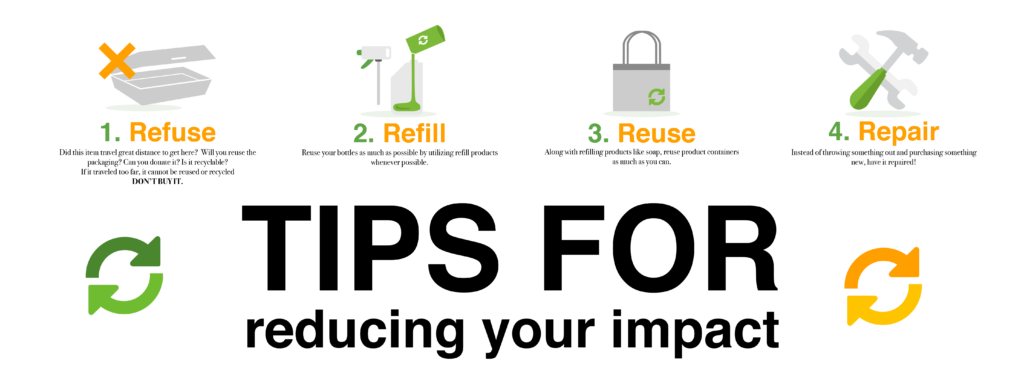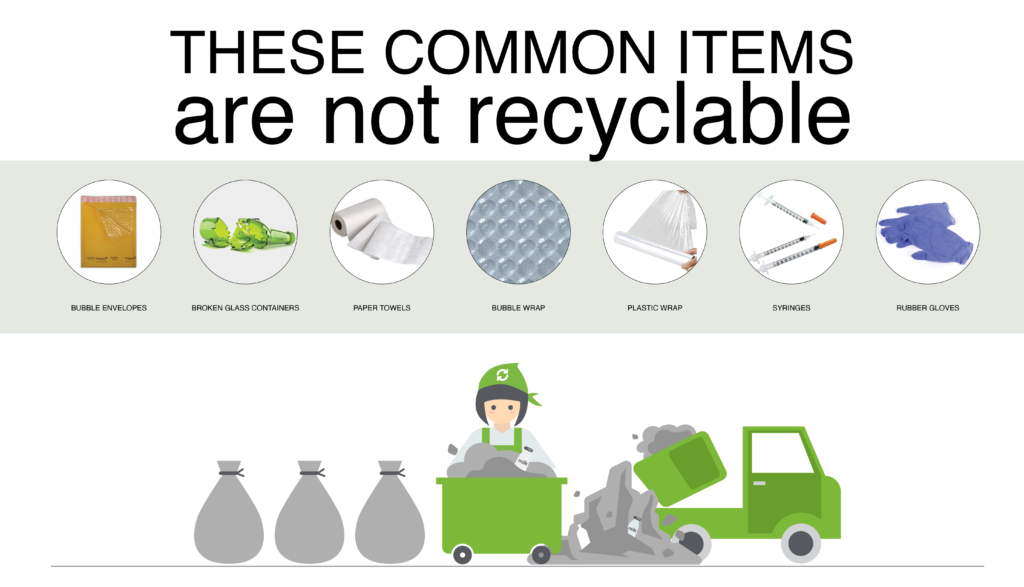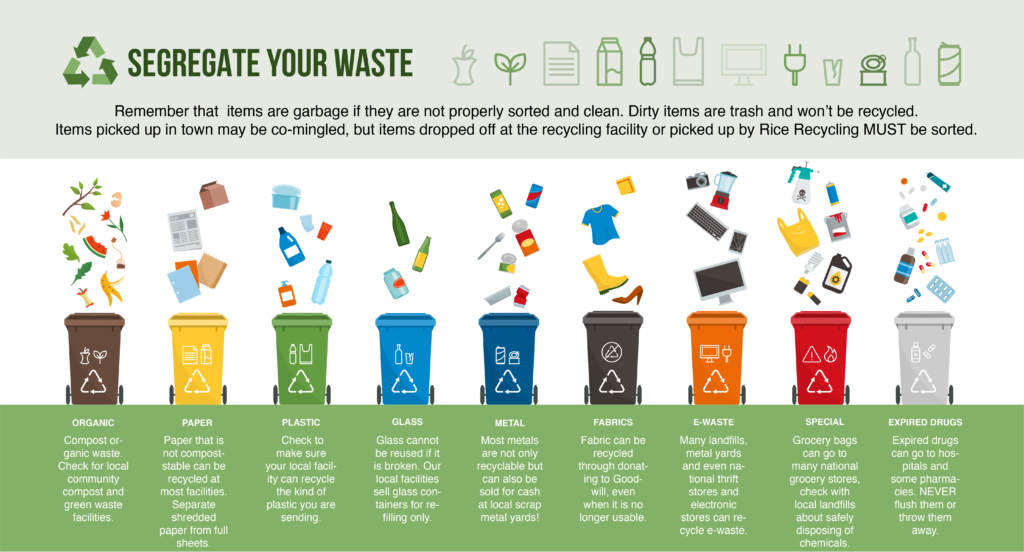Corey Najarian-Rice is the queen of recycling. In honor of America Recycles Day, she and I took some time to discuss recycling, and more. Corey has been passionate about taking care of our earth and being smart about how items are being used since she was young. As a young adult, she lived with a man that was learning Xeriscaping in Albuquerque. Even in the high population apartment neighborhood they lived in, they had systems to reuse gray water, compost and grow food. She worked with him in his curb-painting business, learning to build routes that had the lowest carbon footprint.
Later, just after they bought a truck, Corey’s husband was laid off. She told him “Well, if we are going to keep this truck, we need to find a way for it to pay for itself. . . and I have an idea.”
Her kids had been watching the movie “Robots” and a quote from the movie stuck in her mind: “See a need, fill a need.” She saw a need. Delta had no pick-up service for recycling.
Using her knowledge of recycling and creating pick up-routes, Corey started her business: Rice Recycling. In business since 2011, Corey has learned a lot about recycling, so it made sense to ask her to share her knowledge to help us all be better stewards of our world.
“Recycling is a last resort” Corey says “Rice Recycling isn’t about helping you recycle more. It is about helping you reduce your carbon footprint. And we don’t recycle rice. I was called once, no joke, about 5 tons of basmati rice.”

For Corey, her business is less about making money and more about a passion for the environment and global change through local action. “Recycling is a global issue. It’s all about your carbon footprint. Carbon footprint is tied to population growth, white supremacy and privilege. And plastic is the worst offender. It is made from oil. American soldiers have died for plastic consumption because it is tied to oil consumption.”
The general population’s need for cheaper and more convenient products has fed an environment and economy devastating monster. Fuel is burned to make items and their packaging. It is used to transport items. Giant corporations like Wal-Mart and Amazon ship items all over the world. Fuel is also used when those items are taken to a landfill or recycled. This practice of purchasing cheaper items made overseas comes at a great cost.
Every piece of plastic made still exists today. Plastic takes a long time to degrade. Chances are, every piece of plastic you have purchased, used for a moment and then thrown out still exists somewhere. And yet, according to the EPA, a whopping 91.6% of all plastics go un-recycled.
What can we do? How do we make any impact on this global issue?
Corey’s answer “Love first, and make good choices. Focus on local change. Start with the purchase. Ignore all the marketing. Is it from a local source? Or at least the US? Can you repurpose it? Compost it? Recycle it? Understand what recycles in your area and where it goes afterwards. Here, recycling goes from your home to the sorting center in Grand Junction. Then it is shipped by rail to Denver. So, reduce your need and reuse as much as you can.”
“Recycling centers only accept what they can sell. The most recyclable and valuable items are 1 and 2 plastics, and aluminum. Try to use more environmentally friendly materials like cotton. Cotton cleaning rags, clothing, shopping bags etc. Reusable shopping bags and microfiber towels are made with new plastics and are not recyclable.”

Clothing with plastic fibers and microfiber cleaning cloths pose another problem to the environment. As they are washed, tiny bits of plastic fall off of them into the water, go down the drain and into the water system. These micro-plastics collect in our water systems and in our oceans. At this point, it is very difficult to avoid plastic in our clothing, so we suggest using either a Guppy Friend laundry bag, or a Cora Ball to reduce the amount of micro-plastics entering your drainage systems. And when you are finished with the fabric items you have used- recycle those too! Donate any and all fabric- even old, torn and worn out items that are not wearable- to Goodwill to ensure that items do not end up in a landfill. If you do not want to donate to Goodwill, you can opt to use a mail-in service like TerraCycle.
Corey adds: “Another point that may not be understood is that Styrofoam is not recyclable in most areas. Styrofoam recycling is limited to coastal cities. Corey says “Boycott companies that use Styrofoam. Write them a letter to ask them not to use it. You would be surprised how much impact a well written letter can have.”
Glass is another item that people think is more recyclable than it is. The reality is that most glass that is “recycled” by consumers is actually crushed and used as ground covers in landfills.
Corey has a few tips for effective recycling on the Western Slope:
- Wash out all your recycling items. Use your dishwasher to reduce your water usage. (Yes, dishwashers use far less water than washing dishes by hand)
- Unwashed items are not recyclable. They are trash.
- Items must be at least the size of the palm of your hand or they cannot be recycled.
- Sort your items properly. (especially if you are taking your items to the recycling center or using Rice Recycling). Items that are not sorted well waste time, money and energy.
- Is getting all the peanut butter out of the jar making you crazy? Grind your own! Save time and money. Plus, you can get grinders made here in the USA!
- Crush water bottles and jugs. Bottles that are not crushed take up a lot more space.
- Know what items are not recyclable. Common items that people mistake as recyclable are:
- Bubble wrap and paper envelopes with bubble wrap liners.
- Cling Wrap
- Rubber Gloves
- Syringes
- Paper towels
- Plastic soda bottle lids
- Items smaller than your palm
- Broken glass

Rice Recycling: Personal curb-side service for Delta and Montrose Counties can be reached at (970) 874-1240. Sales area: Delta county as far as Summerset, Montrose County to Black Mesa Rd, Peach Valley and from Delta to the Recycling drop-off. Reduce your carbon footprint! Group with neighbors and friends and save money by keeping a single pick-up site. During consultation, Corey will give a detailed lesson on reducing, reusing, and proper recycling, and can also present to your group or organization.